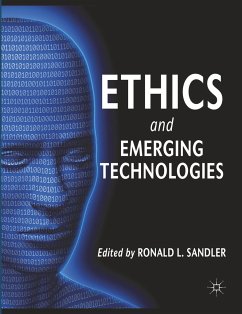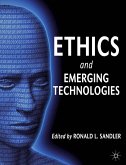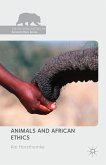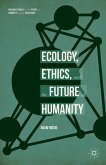Ethics and Emerging Technologies
Herausgegeben:Sandler, Ronald
Ethics and Emerging Technologies
Herausgegeben:Sandler, Ronald
- Gebundenes Buch
- Merkliste
- Auf die Merkliste
- Bewerten Bewerten
- Teilen
- Produkt teilen
- Produkterinnerung
- Produkterinnerung
First and only undergraduate textbook that addresses the social and ethical issues associated with a wide array of emerging technologies, including genetic modification, human enhancement, geoengineering, robotics, virtual reality, artificial meat, neurotechnologies, information technologies, nanotechnology, sex selection, and more.
Andere Kunden interessierten sich auch für
![Ethics and Emerging Technologies Ethics and Emerging Technologies]() Ethics and Emerging Technologies76,99 €
Ethics and Emerging Technologies76,99 €![Animals and African Ethics Animals and African Ethics]() Kai HorsthemkeAnimals and African Ethics60,99 €
Kai HorsthemkeAnimals and African Ethics60,99 €![Ecology, Ethics, and the Future of Humanity Ecology, Ethics, and the Future of Humanity]() Adam RiggioEcology, Ethics, and the Future of Humanity38,99 €
Adam RiggioEcology, Ethics, and the Future of Humanity38,99 €![A Moral Defense of Recreational Drug Use A Moral Defense of Recreational Drug Use]() Rob LoveringA Moral Defense of Recreational Drug Use38,99 €
Rob LoveringA Moral Defense of Recreational Drug Use38,99 €![Ethical Intuitionism Ethical Intuitionism]() M. HuemerEthical Intuitionism75,99 €
M. HuemerEthical Intuitionism75,99 €![Ethics and Philosophical Critique in William James Ethics and Philosophical Critique in William James]() Sarin MarchettiEthics and Philosophical Critique in William James38,99 €
Sarin MarchettiEthics and Philosophical Critique in William James38,99 €![The Non-Sovereign Self, Responsibility, and Otherness The Non-Sovereign Self, Responsibility, and Otherness]() Rosine KelzThe Non-Sovereign Self, Responsibility, and Otherness97,99 €
Rosine KelzThe Non-Sovereign Self, Responsibility, and Otherness97,99 €-
-
-
First and only undergraduate textbook that addresses the social and ethical issues associated with a wide array of emerging technologies, including genetic modification, human enhancement, geoengineering, robotics, virtual reality, artificial meat, neurotechnologies, information technologies, nanotechnology, sex selection, and more.
Produktdetails
- Produktdetails
- Verlag: Macmillan Education / Palgrave Macmillan UK / Springer Palgrave Macmillan
- Artikelnr. des Verlages: 978-0-230-36702-9
- 2013
- Seitenzahl: 600
- Erscheinungstermin: 29. Oktober 2013
- Englisch
- Abmessung: 252mm x 194mm x 38mm
- Gewicht: 1276g
- ISBN-13: 9780230367029
- ISBN-10: 023036702X
- Artikelnr.: 37744042
- Herstellerkennzeichnung Die Herstellerinformationen sind derzeit nicht verfügbar.
- Verlag: Macmillan Education / Palgrave Macmillan UK / Springer Palgrave Macmillan
- Artikelnr. des Verlages: 978-0-230-36702-9
- 2013
- Seitenzahl: 600
- Erscheinungstermin: 29. Oktober 2013
- Englisch
- Abmessung: 252mm x 194mm x 38mm
- Gewicht: 1276g
- ISBN-13: 9780230367029
- ISBN-10: 023036702X
- Artikelnr.: 37744042
- Herstellerkennzeichnung Die Herstellerinformationen sind derzeit nicht verfügbar.
Keith Abney, Ethics and Emerging Sciences Group, California Polytechnic State University, USA. Fritz Allhoff, Department of Philosophy, Western Michigan University, USA. John Basl, Department of Philosophy, Bowling Green State University, USA. Francoise Baylis, Faculty of Medicine, Dalhousie University, Canada Mark Bedau, Department of Philosophy, Reed University, USA. George Bekey, Computer Science Department, University of Southern California, USA. Nick Bostrom, Faculty of Philosophy, University of Oxford UK. Maria Bottis, Department of Archives and Library Science, Ionian University, Greece Philip Brey, Department of Philosophy, University of Twente, The Netherlands Philip Cafaro, Department of Philosophy, Colorado State University, USA. James Collins, School of Life Sciences, Arizona State University, USA. Gary Comstock, Department of Philosophy, North Carolina State University, USA. Inmaculada de Melo-Martin, Division of Medical Ethics, Cornell Medical College, USA. Thomas Douglas, Uehiro Centre for Practical Ethics, University of Oxford, UK. Kevin Elliott, Department of Philosophy, University of South Carolina, USA. Lucy Frith, Department of Health Services Research, University of Liverpool, UK. Tamara Garcia, College of Law, Georgia State University, USA. Michele Garfinkle, Science Policy Programme, European Molecular Biology Organization (EMBO), Germany Marin Gillis, Department of Humanities, Health and Society, Florida International University, USA. Walter Glannon, Department of Philosophy, University of Calgary, USA. Clive Hamilton, Centre for Applied Philosophy and Public Ethics, Charles Sturt University, Australia Kenneth Himma, Department of Philosophy, Seattle Pacific University, USA. Hans Jonas, Department of Philosophy, New School of Social Research, USA. Leon Kass, Committee on Social Thought, University of Chicago, USA. Lori Knowles, Health Law Institute, University of Alberta, Canada Ray Kurzweil, Director of Engineering, Google, USA. Matthew Liao, Center for Bioethics, New York University, USA. Patrick Lin, Ethics and Emerging Sciences Group, California Polytechnic State University, USA. Ben Minteer, School of Life Sciences, Arizona State University, USA. Arnold Pacey, The Open University, UK. Christopher Preston, Department of Philosophy, University of Montana, USA. Michael Ravvin, Department of Political Science, Columbia University, USA. Jason Robert, Center for Biology and Society, Arizona State University, USA. Ronald Sandler, Department of Philosophy and Religion, Northeastern University, USA. Vandana Shiva, Navdanya Research Foundation for Science Technology and Ecology, India Richard Spinello, Carroll School of Management, Boston College, USA. Jay Stanley, Speech, Privacy and Technology Project, American Civil Liberties Union, USA. Barry Steinhardt, Program on Technology and Liberty, American Civil Liberties Union, USA. Robert Streiffer, Department of Medical History and Bioethics, University of Wisconsin, USA. PaulThompson, Department of Philosophy, Michigan State University, USA. Mark Triant, Interactive Telecommunications, New York University, USA. Jeroen Van den Hoven, Technology, Policy and Management, Delft University, The Netherlands Wendell Wallach, Interdisciplinary Center for Bioethics, Yale University, USA. Langdon Winner, Department of Science and Technology Studies, Rensselaer Polytechnic Institute, USA.
Preface Structure and User's Guide Acknowledgments Introduction PART I: GENERAL REFLECTION ON ETHICS AND TECHNOLOGY 1. Section Overview 2. Technology: Practice and Culture; A. Pacey 3. Technology and Responsibility: Reflections on the New Tasks of Ethics; H. Jonas 4. Technologies as Forms of Life; L. Winner PART II: REPRODUCTIVE TECHNOLOGIES 5. Section Overview 6. Reproductive Technologies: Ethical Debates; L. Frith 7. Preventing a Brave New World; L. Kass 8. The Ethics of Sex Selection; I. de Melo-Martin 9. Selecting Children: The Ethics of Reproductive Genetic Engineering; M. Liao PART III: BIOMEDICAL AND THERAPEUTIC TECHNOLOGIES 10. Section Overview 11. Ethical Issues in Human Stem Cell Research; I. de Melo-Martin and M. Gillis 12. Crossing Species Boundaries; J. Robert and F. Baylis 13. The Coming Era of Nanomedicine; F. Allhoff 14. Psychopharmacology and Functional Neurosurgery: Manipulating Memory, Thought, and Mood; W. Glannon 15. Incentivizing Access and Innovation for Essential Medicines: A Survey of the Problem and Proposed Solutions; M. Ravvin PART IV: HUMAN ENHANCEMENT TECHNOLOGIES 16. Section Overview 17. Beyond Therapy; United States President's Council on Bioethics 18. Why I Want to be a Posthuman When I Grow Up; N. Bostrom 19. Moral Enhancement; T. Douglas 20. Enhancing Justice; T. Garcia and R. Sandler PART V: INFORMATION TECHNOLOGY 21. Section Overview 22. Bigger Monster, Weaker Chains: The Growth of An American Surveillance Society; J. Stanley and B. Steinhardt 23. Nanotechnology and Privacy: The Instructive Case of RFID; J. Van den Hoven 24. Intellectual Property: Legal and Moral Challenges of Online File Sharing; R. Spinello 25. Virtual Reality and Computer Simulation; P. Brey 26. The Digital Divide; K. Himma and Maria Bottis PART VI: ROBOTICS AND ARTIFICIAL INTELLIGENCE 27. Section Overview 28. Ethics, War, and Robots; P. Lin, K. Abney and G. Bekey 29. Ethics, Law, and Governance in the Development of Robots; W. Wallach 30. What to do About Artificial Consciousness; J. Basl 31. The Singularity is Near; R. Kurzweil PART VII: ENVIRONMENT AND TECHNOLOGY 32. Section Overview 33. Risk, Precaution, and Nanotechnology; K. Elliott 34. Avoiding Catastrophic Climate Change: Why Technological Innovation is Necessary but Not Sufficient; P. Cafaro 35. Ethical Anxieties about Geoengineering; C. Hamilton 36. Ecosystems Unbound: Ethical Questions for an Interventionist Ecology; B. Minteer and J. Collins PART VIII: AGRICULTURAL TECHNOLOGY 37. Section Overview 38. Ethics and Genetically Modified Foods; G. Comstock 39. Women and the Gendered Politics of Food; V. Shiva 40. The Ethics of Agricultural Animal Biotechnology; R. Streiffer and J. Basl 41. Artificial Meat; P. Thompson PART IX: SYNTHETIC GENOMICS AND ARTIFICIAL LIFE 42. Section Overview 43. Synthetic Biology, Biosecurity, and Biosafety; M. Garfinkle and L. Knowles 44. Evolution and the Deep Past: Intrinsic Responses to Synthetic Biology; C. Preston 45. Social and Ethical Implications of Creating Artificial Cells; M.A. Bedau and M. Triant Index
Preface Structure and User's Guide Acknowledgments Introduction PART I: GENERAL REFLECTION ON ETHICS AND TECHNOLOGY 1. Section Overview 2. Technology: Practice and Culture; A. Pacey 3. Technology and Responsibility: Reflections on the New Tasks of Ethics; H. Jonas 4. Technologies as Forms of Life; L. Winner PART II: REPRODUCTIVE TECHNOLOGIES 5. Section Overview 6. Reproductive Technologies: Ethical Debates; L. Frith 7. Preventing a Brave New World; L. Kass 8. The Ethics of Sex Selection; I. de Melo-Martin 9. Selecting Children: The Ethics of Reproductive Genetic Engineering; M. Liao PART III: BIOMEDICAL AND THERAPEUTIC TECHNOLOGIES 10. Section Overview 11. Ethical Issues in Human Stem Cell Research; I. de Melo-Martin and M. Gillis 12. Crossing Species Boundaries; J. Robert and F. Baylis 13. The Coming Era of Nanomedicine; F. Allhoff 14. Psychopharmacology and Functional Neurosurgery: Manipulating Memory, Thought, and Mood; W. Glannon 15. Incentivizing Access and Innovation for Essential Medicines: A Survey of the Problem and Proposed Solutions; M. Ravvin PART IV: HUMAN ENHANCEMENT TECHNOLOGIES 16. Section Overview 17. Beyond Therapy; United States President's Council on Bioethics 18. Why I Want to be a Posthuman When I Grow Up; N. Bostrom 19. Moral Enhancement; T. Douglas 20. Enhancing Justice; T. Garcia and R. Sandler PART V: INFORMATION TECHNOLOGY 21. Section Overview 22. Bigger Monster, Weaker Chains: The Growth of An American Surveillance Society; J. Stanley and B. Steinhardt 23. Nanotechnology and Privacy: The Instructive Case of RFID; J. Van den Hoven 24. Intellectual Property: Legal and Moral Challenges of Online File Sharing; R. Spinello 25. Virtual Reality and Computer Simulation; P. Brey 26. The Digital Divide; K. Himma and Maria Bottis PART VI: ROBOTICS AND ARTIFICIAL INTELLIGENCE 27. Section Overview 28. Ethics, War, and Robots; P. Lin, K. Abney and G. Bekey 29. Ethics, Law, and Governance in the Development of Robots; W. Wallach 30. What to do About Artificial Consciousness; J. Basl 31. The Singularity is Near; R. Kurzweil PART VII: ENVIRONMENT AND TECHNOLOGY 32. Section Overview 33. Risk, Precaution, and Nanotechnology; K. Elliott 34. Avoiding Catastrophic Climate Change: Why Technological Innovation is Necessary but Not Sufficient; P. Cafaro 35. Ethical Anxieties about Geoengineering; C. Hamilton 36. Ecosystems Unbound: Ethical Questions for an Interventionist Ecology; B. Minteer and J. Collins PART VIII: AGRICULTURAL TECHNOLOGY 37. Section Overview 38. Ethics and Genetically Modified Foods; G. Comstock 39. Women and the Gendered Politics of Food; V. Shiva 40. The Ethics of Agricultural Animal Biotechnology; R. Streiffer and J. Basl 41. Artificial Meat; P. Thompson PART IX: SYNTHETIC GENOMICS AND ARTIFICIAL LIFE 42. Section Overview 43. Synthetic Biology, Biosecurity, and Biosafety; M. Garfinkle and L. Knowles 44. Evolution and the Deep Past: Intrinsic Responses to Synthetic Biology; C. Preston 45. Social and Ethical Implications of Creating Artificial Cells; M.A. Bedau and M. Triant Index
"Sandler's book Ethics and Emerging Technologies offers an overview of the topic and gathers contributions from philosophers, ethicists, and policy scholars in an attempt to help students develop linguistic, conceptual, critical, and perspectival resources which will enable them to think carefully about the ethics of new technologies. ... For those who have been focusing on nanoethics, this book is thus a suitable starting point for an exploration or comparison of key ethical issues relating to different types of technology domains." (Laura Yenisa Cabrera Trujillo, Nanoethics, Vol. 9, 2015)








